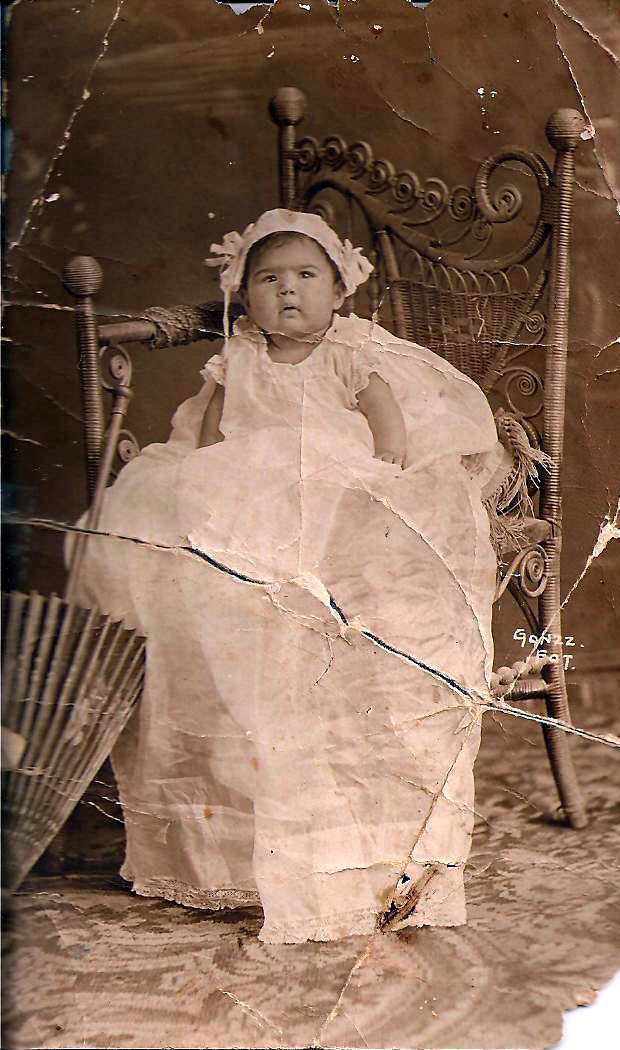TRANSCRIPTION
What was your childhood like? What would you do for fun?
Well, I really don't remember too much but I do remember being behind my mom to see how she would cook so that I could learn how to cook. This was when I was about 11 years old. Since I was the oldest, I wanted to learn how to do these things because whenever she was sick, I was the one that would take over.
What was school like for you as a child?
I had graduated to the eighth grade and had passed to grade nine but had only gone through half of it. Then, vacation came and I started working at a house taking care of two little boys. It was a Russian family that they were from. I got paid three dollars each Sunday doing that. I did not go back to school in September. I just kept on working.
While in school, did you ever experience any kind of segregation or discrimination?
Well I only remember that they would advise us to speak English outside in the yard and everywhere around the school. They told us not to speak Spanish. Only in Spanish class were we able to speak Spanish.
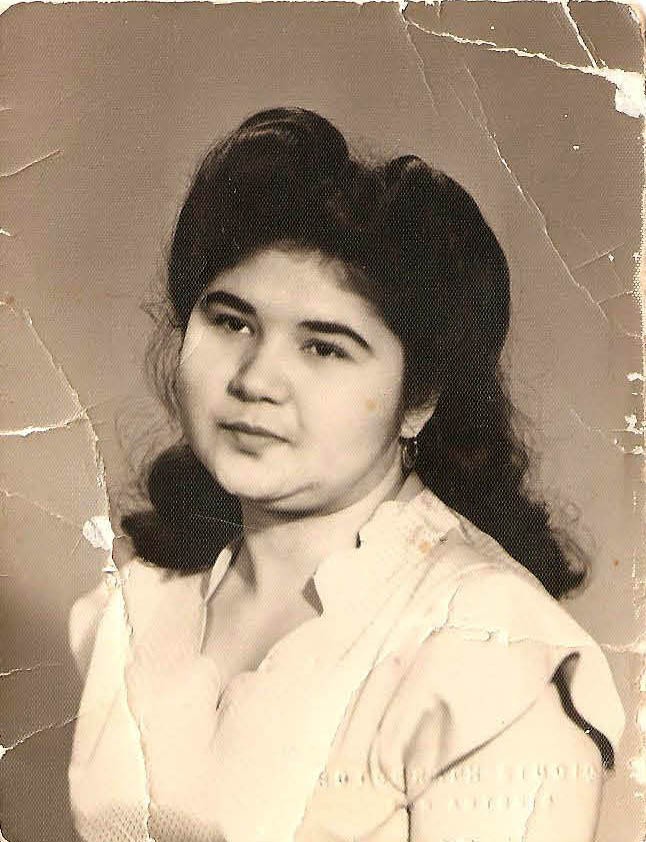
Describe your life during the Great Depression. What do you remember from it and how did it affect you the most?
Well, I know I remember there were no jobs. People would go out and look for jobs but could not find anything. People would go to a place that was called "The White House" or "La Casa Blanca". They had an unemployment office there and that's where everybody would go to find work. From there, they would give you some addresses to different places to see if that place would hire you. My daddy could not find a job. From what he could do, there was no work that would hire him. Then he got the best job that he had ever had at the Pearl Brewery Company. It was the job that paid the best at that time. He lasted there 19 years. He would work in the garage and take the beer by hand from the big trucks and deliver them to where they would order from. When he wasn't working there, he would work seasonally at the compress. They would deliver big barrels of cotton from the train that my dad would unload. He would get paid 15 dollars a week and that was good in those days because everything was cheap. We would buy a dollar of groceries that my mom would manage to buy a lot with.
Did your family receive any government aid during the Depression?
No, we didn't receive any help. My daddy was a hard working man. He would take any job that they would give him so that we could have money. My momma knew how to save. She dealt with what we were given and what we had. She always made sure there was food on the table. She would even make me and my sisters' dresses. She would buy the material and without a pattern, sew our dresses.
What other jobs did you have when you were growing up?
I worked for the National Youth Administration. You had to be 18 to work there. I worked there for a whole year. They were located near me off of Laredo Street but moved over to a place that, at the time was called, the Exposition Grounds, which was out of my way and very far. There, they would teach us how to sew and to use power machines. They were all girls that worked in that area but they had another place for boys. They would teach the boys how to do wood work. After that, I started working at a t at Fort Sam Laundromat during WWII. Most of the clothes that they would send there would be from the soldiers of the war. I started out folding clothes but then they put me in the back where I took care of four markers. They would mark the serial number of each solider on the uniform. I would take about 60 to 65 bags of uniforms that were in a basket. Those bags would last me all day, from seven to three.
What would you use for transportation during this time?
Well at first I would have to take the bus very early to make it to work on time. Then I met two girls that worked there with me. They would get a ride from their father so they offered to take me too. They would come around before seven o'clock because at seven we would start working. I would then pay them when I would get paid.
How did you and your family manage when someone would become ill?
Well, my momma would always suffer of varicose veins so she would have to rest a lot for that. I always took care of her and everyone else in the family. There was a time when my mother got sick when I was working so I had to leave my job to take care of her. It was after that when I was about 24, I went to the doctor and they found a spot on my right lung that turned out to be Tuberculosis. The doctor found a cavity that was the size of a pea. He decided to arrange for me to go to a hospital that they had in San Angelo, Texas. I had to fill out papers and then wait to go until they had a bed for me there. It wasn't too long. It was a month that I had to wait. My daddy went with me after receiving the papers telling me that I could go. We took the Greyhound bus and it took us eight hours to get there. We left at seven o'clock in the morning and got there around two or three in the afternoon. When he saw that I was okay there, he came back home. When I first got there, they made us take a shower to make sure we were clean and our hair was clean. They had us then stay at the dormitory where they had beds lined up. I remember it was in November and that room was very cold. Pretty soon after that they had sent me to the hospital that was in the same complex. I had the best care there because each person had their own room and we had our own privacy. Everyone there was being treated for Tuberculosis. It was a type of quarantine. I had to stay there for nine months. Every three months they would check us and give us x-rays but I was almost ten months over there. I only saw my daddy two times when I was there. I couldn't see my family. My mom would write me and I would write back. Juanita, my friend, and a lady from the missionary church would write to me. I had a lot of encouragement with those letters. I didn't think about taking my bible though. I would have had a lot of time to read. They also would bring in a man from a barber shop that would come in to wash our hair for us because they didn't want us doing a lot of exercise or put stress on ourselves.
What was the treatment for the Tuberculosis?
It was mostly bed rest. They also injected me with gas. I felt a lot of pain when they would inject me. They would sort of blow you up. Then they found out that it was getting worse so they stopped that right away. So while I was there, I didn't take any medication. It was mostly bed rest. The doctor that was treating me there gave me three names of specialist of lung diseases that were back in San Antonio. So when I came back I started going to the one I had chosen. There they would give me an injection once a week that cost me fifteen dollars each time. They would also have what they called a fluoroscope. It was like an x-ray that would check my lungs. I did that for quite a while.
Did you receive any financial help for any of the treatments?
When I was in San Angelo, they paid for everything. I think that the families that had the money would pay but they paid for everything with me. They never treated me differently. They treated me very well when I was there. When I was here, I had to pay for the treatment each week.
Is there anything that you regret doing or not doing throughout your life?
I regret not staying in school. I always thought to at least graduate from high school but times were hard and I had to keep on working. Then after that was when I got sick.
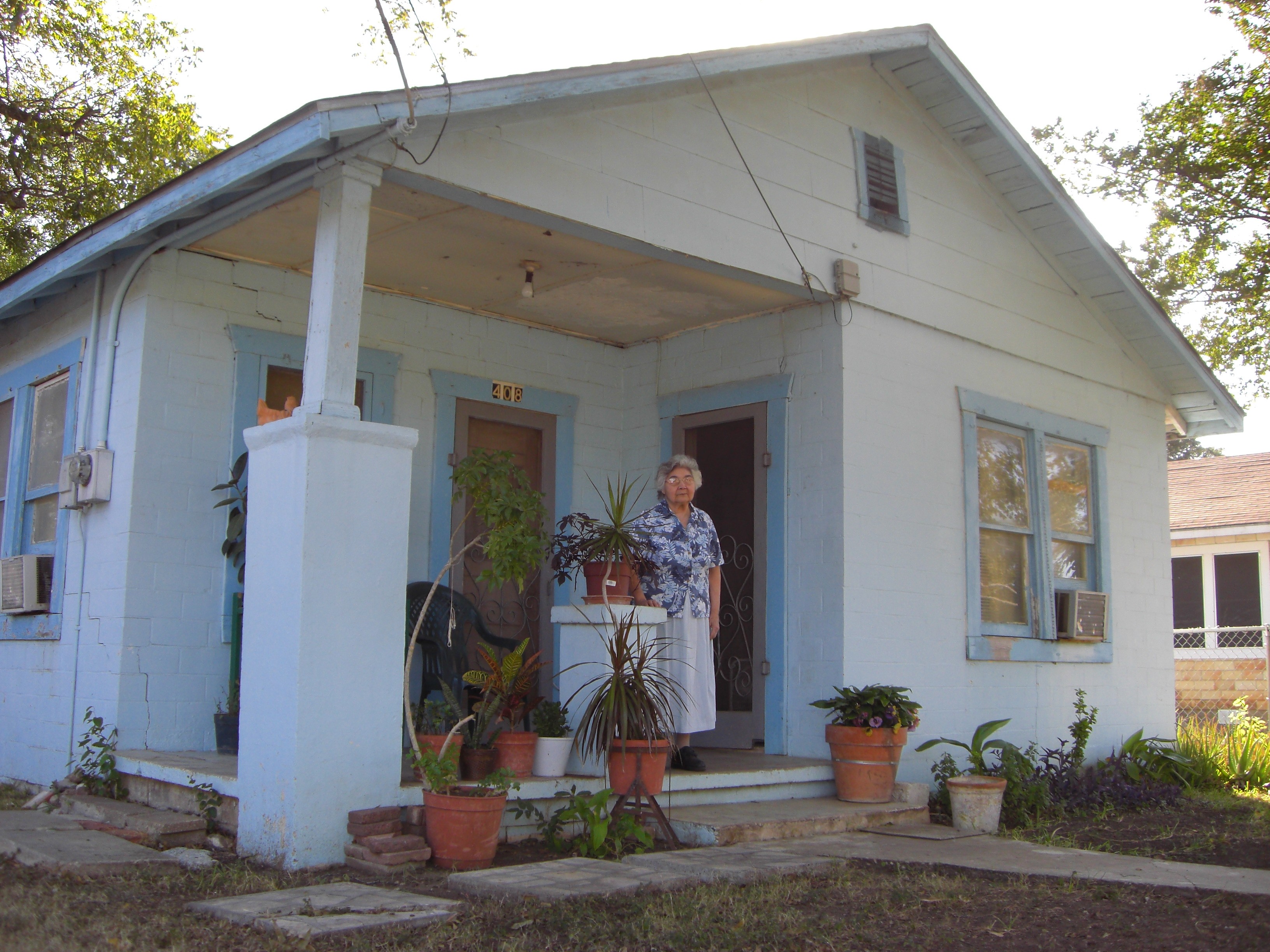
What would be your best advice to give to someone young that they would carry throughout their life?
Be content with what you have. Make the best of it and don't let anything get you down. I remember my dad buying lots of where we were going to live and then build the house on the lot. We never had to pay rent. We just paid taxes. I would never ask for anything. I was happy with what we had. You don't miss anything that you never had.
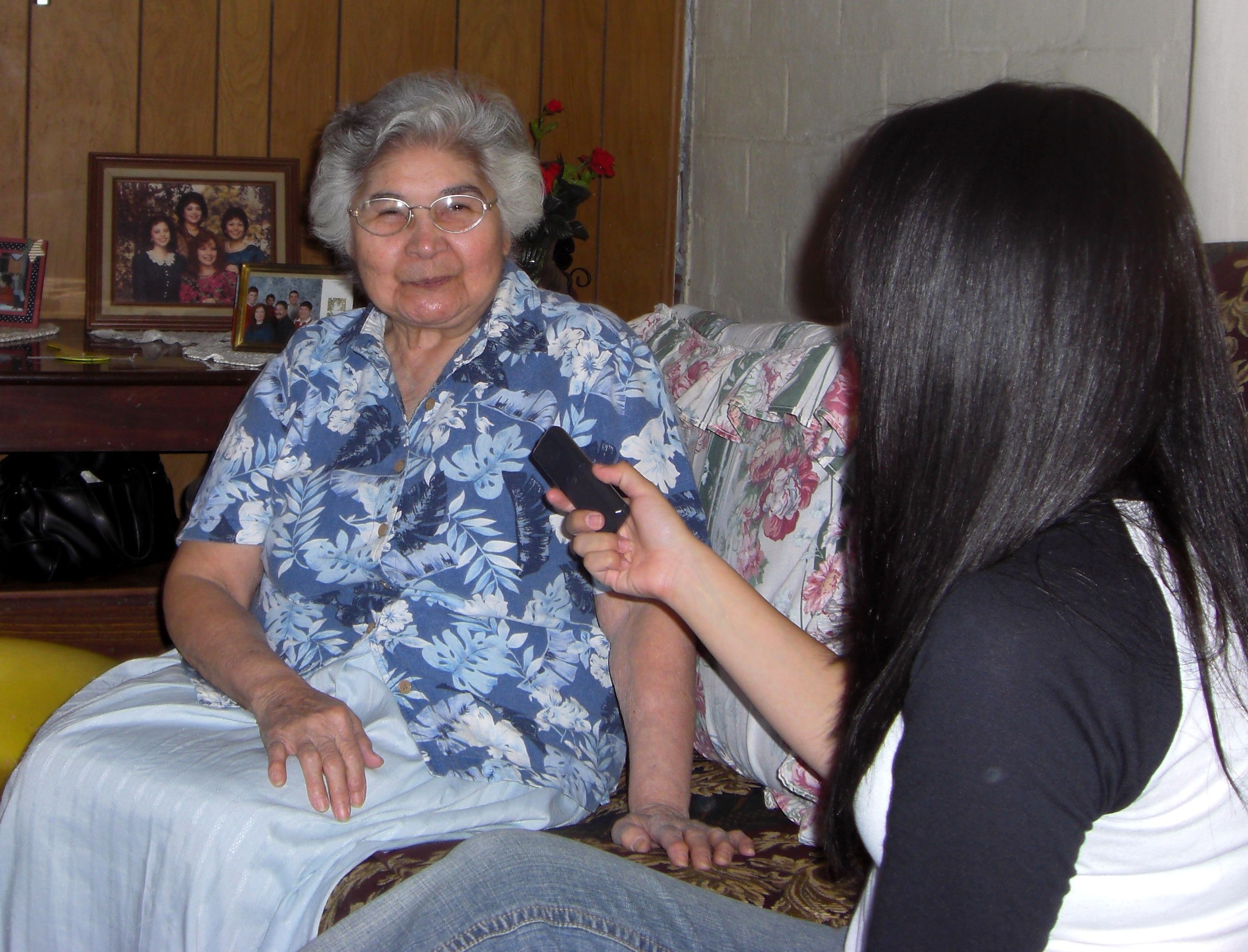
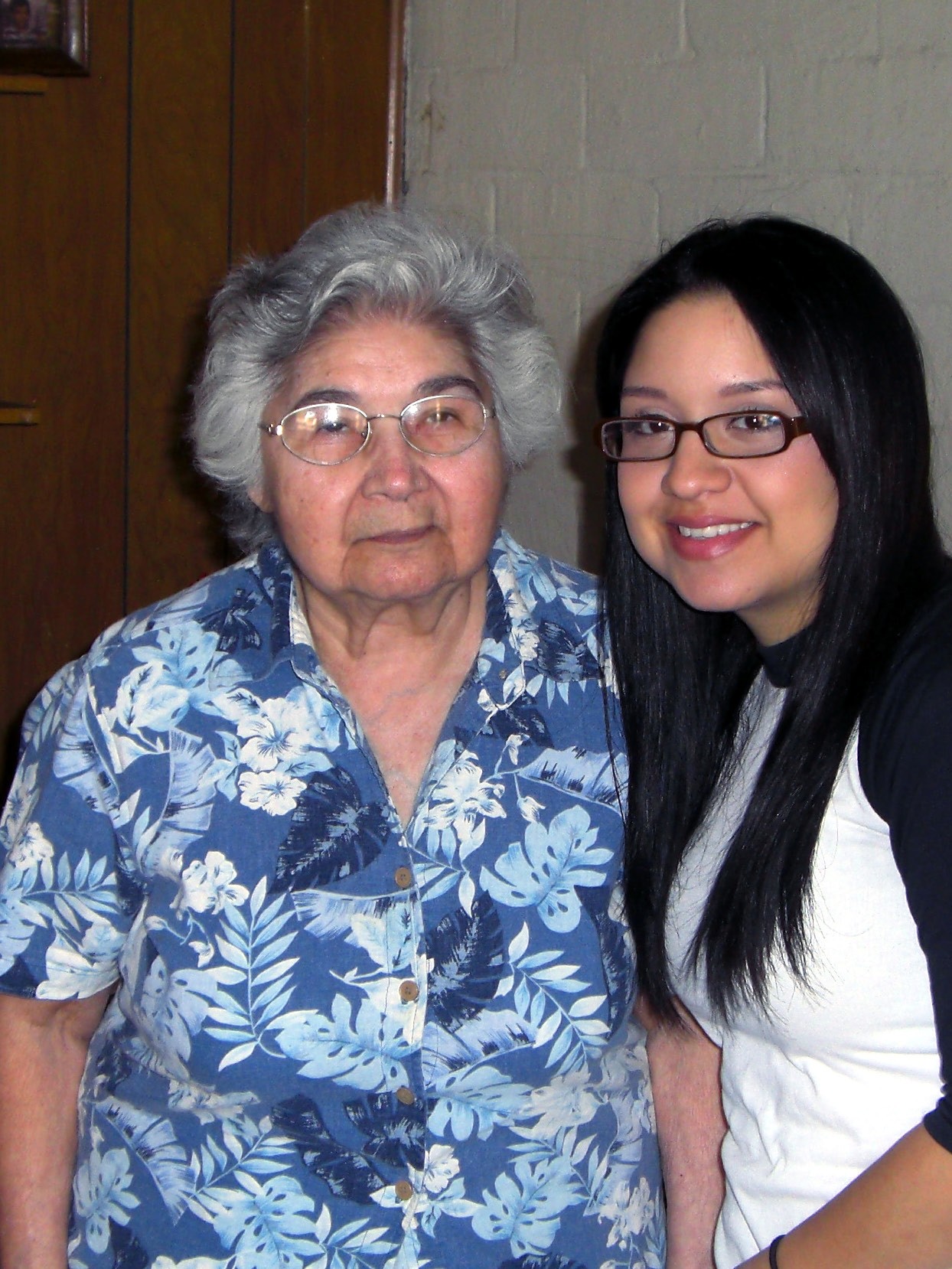
ANALYSIS
After doing this interview on my grandaunt, I have come to realize many things. First of all, I without doubt got a better understanding of her life and how she was able to overcome certain difficulties during the time of the Great Depression. Antonia made it very clear to me how people really had to work hard, not to get what they wanted, but to get what they needed. Naturally, this made me really reflect on the financial conditions of the U.S. today. I truly appreciate just how privileged we are to live in this day and age and have also really come to value what I encompass as an individual. I have always known what a good person my grandaunt is, but after doing this interview, I can in fact say that she is one of the most kindhearted and caring people I have known. She never put herself before anyone and she always helped those around her without hesitation. I really consider her a sort of rare individual that I will always look up to and think about when I feel like I cannot get through a certain difficult time of my own. Her strength, humble, and unselfish character indeed push me to want to carry that same spirit throughout my own life. Overall, I believe that this was a great way to not only learn about someone's past, but to learn about the history of our country. Stories that are told and the various emotions that are expressed, really give you a sense of what it would have been like to have lived in that period in time. There's no better way of learning about the history of something or someone than having it told to you straight from the person that experienced that history for themselves.
TIMELINE
- Life begins on March 10, 1924 in San Antonio, Texas
- 1930/1931- began attending Frank Johnson Elementary
- 1939- dropped out of school to start working
- 1939-1941 worked taking care of two Russian boys
- 1942-1943 began working for the National Youth Administration
- 1948 diagnosed with Tuberculosis and sent to San Angelo, Texas for treatment
- 1949 returned home to San Antonio
- 1949 got baptized and began focusing her life around the Baptist religion
- 2008 interviewed by Ann Marie Hernandez
ANNOTATED BIBLIOGRAPHY
- The Handbook of Texas Online is a project of the Texas State Historical Association. It was published by the Texas State Historical Association and distributed in partnership with Holt, Rinehart and Winston, a Harcourt Education Company. It offers various historic, geographic, and cultural facts of Texas. Copyright @ Texas State Historical Association.
- The Eleanor Roosevelt Papers Project is a university-chartered research center associated with the Department of History of The George Washington University. It offers Eleanor Roosevelt's writings (and radio and television appearances) on democracy and human rights before an audience as diverse as the ones she addressed.
- The Mayo Clinic is a non-profit medical practice, owned by the Mayo Foundation for Medical Education and Research, is dedicated to the diagnosis and treatment of virtually every type of complex illness. A team of Web professionals and medical experts from Rochester, MN, work side by side to produce this site that serves as a reliable source of health information. Through this unique collaboration, you can gain access to the experience and knowledge of the more than 3,300 physicians, scientists and researchers of Mayo Clinic.
- San Angelo Texas, which is powered by GovOffice, is a site that provides the history, activities, departments, and others valuable information concerning the city of San Angelo.
- Wikipedia is a multilingual, web-based, free content encyclopedia project. It offers a vast amount of information on just about any topic. Wikipedia is written collaboratively by volunteers from all around the world. It is a registered trademark of the nonprofit Wikimedia Foundation, which has created an entire family of free-content projects.
Return to Oral History Projects
